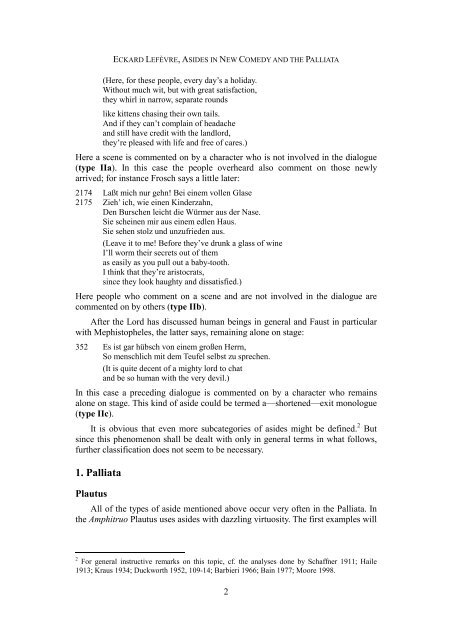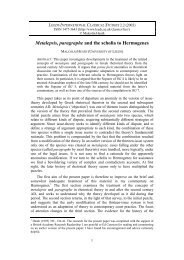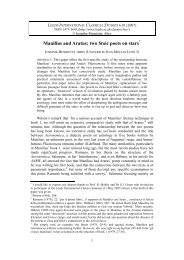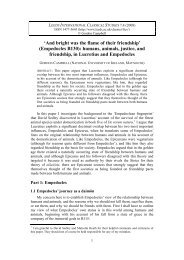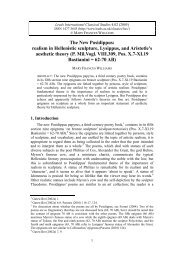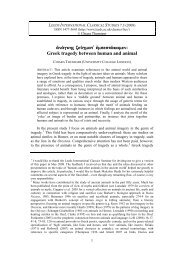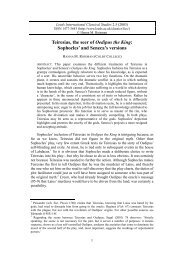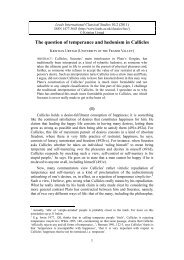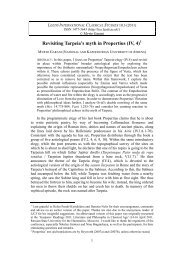Asides in New Comedy and the Palliata - Leeds International ...
Asides in New Comedy and the Palliata - Leeds International ...
Asides in New Comedy and the Palliata - Leeds International ...
Create successful ePaper yourself
Turn your PDF publications into a flip-book with our unique Google optimized e-Paper software.
ECKARD LEFÈVRE, ASIDES IN NEW COMEDY AND THE PALLIATA<br />
(Here, for <strong>the</strong>se people, every day’s a holiday.<br />
Without much wit, but with great satisfaction,<br />
<strong>the</strong>y whirl <strong>in</strong> narrow, separate rounds<br />
like kittens chas<strong>in</strong>g <strong>the</strong>ir own tails.<br />
And if <strong>the</strong>y can’t compla<strong>in</strong> of headache<br />
<strong>and</strong> still have credit with <strong>the</strong> l<strong>and</strong>lord,<br />
<strong>the</strong>y’re pleased with life <strong>and</strong> free of cares.)<br />
Here a scene is commented on by a character who is not <strong>in</strong>volved <strong>in</strong> <strong>the</strong> dialogue<br />
(type IIa). In this case <strong>the</strong> people overheard also comment on those newly<br />
arrived; for <strong>in</strong>stance Frosch says a little later:<br />
2174 Laßt mich nur gehn! Bei e<strong>in</strong>em vollen Glase<br />
2175 Zieh’ ich, wie e<strong>in</strong>en K<strong>in</strong>derzahn,<br />
Den Burschen leicht die Würmer aus der Nase.<br />
Sie sche<strong>in</strong>en mir aus e<strong>in</strong>em edlen Haus.<br />
Sie sehen stolz und unzufrieden aus.<br />
(Leave it to me! Before <strong>the</strong>y’ve drunk a glass of w<strong>in</strong>e<br />
I’ll worm <strong>the</strong>ir secrets out of <strong>the</strong>m<br />
as easily as you pull out a baby-tooth.<br />
I th<strong>in</strong>k that <strong>the</strong>y’re aristocrats,<br />
s<strong>in</strong>ce <strong>the</strong>y look haughty <strong>and</strong> dissatisfied.)<br />
Here people who comment on a scene <strong>and</strong> are not <strong>in</strong>volved <strong>in</strong> <strong>the</strong> dialogue are<br />
commented on by o<strong>the</strong>rs (type IIb).<br />
After <strong>the</strong> Lord has discussed human be<strong>in</strong>gs <strong>in</strong> general <strong>and</strong> Faust <strong>in</strong> particular<br />
with Mephistopheles, <strong>the</strong> latter says, rema<strong>in</strong><strong>in</strong>g alone on stage:<br />
352 Es ist gar hübsch von e<strong>in</strong>em großen Herrn,<br />
So menschlich mit dem Teufel selbst zu sprechen.<br />
(It is quite decent of a mighty lord to chat<br />
<strong>and</strong> be so human with <strong>the</strong> very devil.)<br />
In this case a preced<strong>in</strong>g dialogue is commented on by a character who rema<strong>in</strong>s<br />
alone on stage. This k<strong>in</strong>d of aside could be termed a—shortened—exit monologue<br />
(type IIc).<br />
It is obvious that even more subcategories of asides might be def<strong>in</strong>ed. 2 But<br />
s<strong>in</strong>ce this phenomenon shall be dealt with only <strong>in</strong> general terms <strong>in</strong> what follows,<br />
fur<strong>the</strong>r classification does not seem to be necessary.<br />
1. <strong>Palliata</strong><br />
Plautus<br />
All of <strong>the</strong> types of aside mentioned above occur very often <strong>in</strong> <strong>the</strong> <strong>Palliata</strong>. In<br />
<strong>the</strong> Amphitruo Plautus uses asides with dazzl<strong>in</strong>g virtuosity. The first examples will<br />
2 For general <strong>in</strong>structive remarks on this topic, cf. <strong>the</strong> analyses done by Schaffner 1911; Haile<br />
1913; Kraus 1934; Duckworth 1952, 109-14; Barbieri 1966; Ba<strong>in</strong> 1977; Moore 1998.<br />
2


